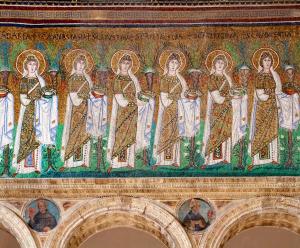
Throughout Christian history, we find Christians promoting the value of women, indicating how and why their dignity and honor should not be neglected. But, sadly, that is not the whole story. While Christians might have said such things, and on some level, believed them, their actions, and other words they said, contradicted such an important principle, showing that the reality of history is far from what apologists using only the noblest sentiments from the past would suggest.
St. Paul told Christians that the in Christ, Christians should come together as equals, as in Christ, there is neither male nor female, neither Jew nor Gentile. While Paul presented a rather important Christian anthropology with such words, he did not always live it out himself, even as Peter didn’t always live out what he preached and needed Paul to make sure he did. It is not, of course, just St. Paul, who failed to live out what he taught. We can find many great patristic writers failing in a similar way. We can find many of them speaking in terms which highlight the equality of women with men, indicating that their gifts should not be ignored by the church. Thus St. Augustine said, God’s concern is for all, men and women: “By possessing a male nature and being born of a woman He further showed by this plan that God has concern not only for the sex He represented but also for the one through which He took upon Himself our nature.”[1] Similarly, St. Jerome wrote that men and women alike were given the same spiritual gifts once they have been included into the body of Christ: “For it is not possible that in the spiritual gifts there should be any difference of sex, since in Christ Jesus there is neither man nor woman [cf. Gal 3:28], but we should all be one in him.” [2] Origen, likewise, in his commentary on Romans, indicated that women should be granted the same rights to ministry in the church as men:
And therefore, this passage teaches two things at the same time: As we have said, women are to be considered ministers in the Church, and the kind who have assisted many and who through good services have merited attaining unto apostolic praise ought to be received in the ministry.[3]
It is possible to find many more quotes from patristic sources which suggest women should enjoy a prominent position in the community. Often, they are found doing so when dealing with some controversy, such as with Gnostics who repudiated the goodness of material being, of sex, and therefore, the value of women because of the role they had in giving birth to new generations of people trapped by material being. Sadly, while they were right in principle, we find the application of that principle tended to be neglected. Yes, we can find a few women being promoted in various parts of the Christian world, such as those who were ordained as deacons, or those who, like St. Pulcheria, who helped significantly in the development of Christian dogmatics, but we find, likewise, many more texts which try to limit women and deny their rightful dignity in the church. It can be quite frustrating seeing the good mixed in with the bad. Often, when apologists do not want us to be concerned with all the bad which has been done, if they want to us to ignore or treat such issues are way over-blown, they present the good which can be found. And again, while the good is important, the reality is that it was not acted upon as much as it should have been, as we find the bad was far more normative in history than the good. This is why, after Vatican II, women have rightfully said Christians need to reconsider what role or roles women can have in the church, engaging ressourcement (return to the sources) and aggiornamento (development) together to do so. For example, ressourcement can help show that women were indeed ordained as deacons, using that as a way to establish the need to restore what was once lost, while aggiornamento would be used to indicate that disciplines can and should change, so that women deacons today would not have to be limited to the functions they had in the past (similar to the way male deacons have once again found a place in the church, but they do so with duties and functions which also differ from that found in the ancient church as well).
Christians need to accept that women, like men, have much to share with us. Because they have had their voice in the church (and in society) artificially limited, the spiritual gifts they have been given, gifts which could have and should have been used to help develop the church, have been lost. This means the church, and society as a whole, has been denied all that God has wanted them to have. What would we be like today if women had not been repressed?
Limiting women undermines social and spiritual development; when they are freed from the prejudices and biases which limit their contribution, society as a whole is going to be improved, as Abdul Ghaffar Khan recognized:
I have always believed that the development of people was possible only when its women stood shoulder to shoulder with their men, like the second wheel of a two-wheeled cart. I am grateful to God that our efforts bore fruit and our women have been awakened; and, if all goes well, our nation will now more forward with progress. [4]
Abdul Ghaffar Khan’s words need to be read carefully, understanding the context in which they came. For, it is clear, he was suggesting a complementarian form of understanding, talking about men and women each being a wheel of a cart. In his day and age, that was a way to promote women and help lift them up. Today, such words can be and often are used to undermine women and their contributions. For it is one thing to say men and women complement each other, it is another to develop what that means in a practical sense. For, it is easy to say they are “separate but equal” and use that to suggest they should have different roles and functions in society, each which are valuable, meaning, women should know their place and keep to it (such as in the home). This is not what Abdul Ghaffar Khan intended, as it was not what many intended with such words when they were trying to promote women’s rights, but, history has shown, not just with women, but with races, the kinds of abuses which can develop with such a sentiment. While a complementarian approach, especially when it was used to promote women instead of to excuse their denigration is society, could be used as a starting point to address the way women have been mistreated by society in a past, it must not be seen as the final word. Women should have the same freedom, the same rights, as men in society. We need diversity in society to make sure that the good of everyone can come together and promote the common good. In the church, everyone is being called to share in the same gifts, because they have been called to bear the same name, Christ, which means they should be given the same freedom:
For numerous and of almost infinite number are the men, women, and children who are distinct from one another and vastly different by birth and appearance, by nationality and language, by customs and age, by opinions and skills, by manners and habits, by pursuits and studies, and still again by reputation, fortune, characteristics, and connections: All are born into the Church and through it are reborn and recreated in the Spirit. To all in equal measures it gives and bestows one divine form and designation, to be Christ’s and to carry his name. [5]
As its best, complementarianism indicated how everyone, how every person, is of value, and should have the same rights and privileges, the same freedom, to realize the good found within themselves so they can share it with everyone else, realizing that they are greater together than apart. That is why it at first served as a challenge to patriarchal society. But, it was quickly turned upside-down and inside out, and used to serve the same kind of abuse it was intended to rectify. We must not fall for an ideology which ends up saying men and women are equal but different in such a way to allow for and promote inequality, justifying, therefore, inequity, instead of the equity of Christ. The way complementarian viewpoints were initially developed to promote the dignity of women was later used to once again subjugate them mirrors the way the early church both promoted and subjugated women, that is, how the early church often did not let its best principles properly develop as it became trapped by cultural biases. And this is exactly what Christianity still need to do with women: liberate them, overcoming the prejudices and biases which prevented them from attaining their rightful place in society and the church. Until it does so, we should not be surprised that women will look to the ambivalence of the Christian tradition in regards their status, see that the ambivalence remains, and be troubled by it. We must heed their voice and truly explore how we can restore what was lost from the past, while updating it to meet the principles which we have learned are necessary for a just society.
[1] St. Augustine, “Faith and the Creed” in Treatises on Marriage and Other Subjects. Trans. Robert P. Russell. Ed. Roy J. Defarrari (New York: Fathers of the Church, Inc., 1955), 326.
[2] St. Jerome, Commentary on Isaiah in St Jerome: Commentary on Isaiah; Origen Homilies 1-9 on Isaiah. Trans. Thomas P. Scheck (New York: Paulist Press, 2015), 712.
[3] Origen, Commentary on the Epistle to the Romans: Books 6-10. Trans. Thomas P. Scheck (Washington, DC: CUA Press, 2002), 291 (cf. Rom 16:12).
[4] Abdul Ghaffar Khan, My Life and Struggle. Trans. Imtiaz Ahmad Sahibzada (Roli Books: Greater Noida, India: 2021), 272.
[5] St. Maximus the Confessor, “The Church’s Mystagogy” in Maximus the Confessor: Selected Writings. Trans. George C. Berthold (New York: Paulist Press, 1985), 187.
Stay in touch! Like A Little Bit of Nothing on Facebook.
If you liked what you read, please consider sharing it with your friends and family!
N.B.: While I read comments to moderate them, I rarely respond to them. If I don’t respond to your comment directly, don’t assume I am unthankful for it. I appreciate it. But I want readers to feel free to ask questions, and hopefully, dialogue with each other. I have shared what I wanted to say, though some responses will get a brief reply by me, or, if I find it interesting and something I can engage fully, as the foundation for another post. I have had many posts inspired or improved upon thanks to my readers.













